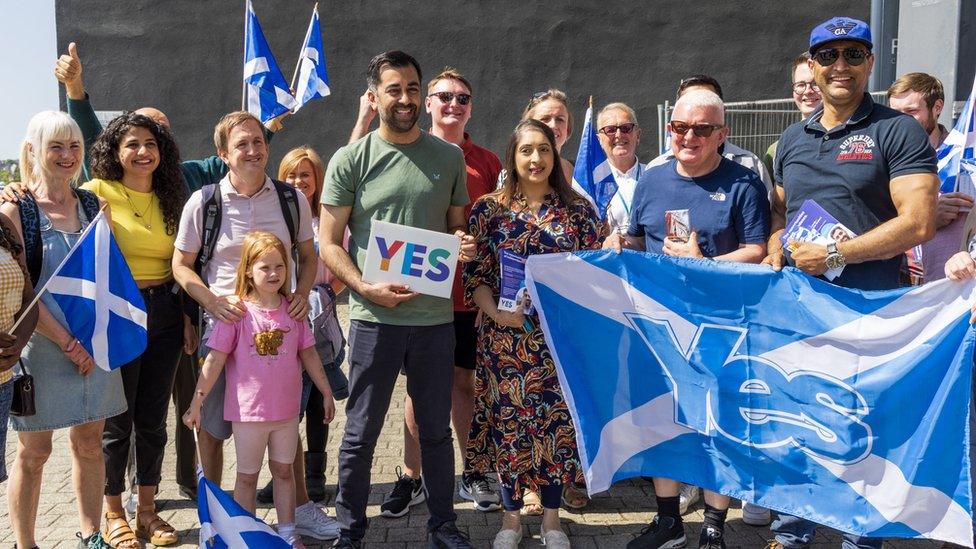Route to Scottish independence must be lawful - SNP leader Humza Yousaf
- Published
First Minister Humza Yousaf said the only route to independence was through "lawful and democratic process".
Humza Yousaf has told a special SNP conference that greater support for Scottish independence must be built ahead of the next general election.
He said if the party won a majority of seats north of the border he would press the UK government for powers to hold a second referendum.
Scotland's first minister added the only route to independence was through "lawful and democratic process".
Both Labour and the Tories are opposed to further talks on another vote.
But Mr Yousaf told a convention in Dundee that his party would stand on the proposition that people could "vote SNP for an independent Scotland".
He later told BBC Scotland: "We will put the simple proposition to the people in a general election because a referendum is being denied to us.
"If we win that general election we will then negotiate with the UK government of how we give it democratic effect.
"If it is a referendum or simply the general election that is of course for the UK government to determine because they have told us time and time again this is a voluntary union. If so then prove it."
The first minister said an election win would mean securing the most seats in Scotland - even if the party ends up with fewer than the 45 it currently holds.
Mr Yousaf also told the convention a summer campaign would focus on the "opportunities of independence" and announced a major march and rally would be held in Edinburgh on 2 September.

The convention was held at the same time as an independence rally in Stirling
Mr Yousaf's speech was interrupted by a protestor demanding a public inquiry into NHS Tayside about its disgraced former head of neurosurgery Sam Eljamel.
The SNP leader stopped his address and went to speak to the woman before returning to the stage after arranging to meet her later.
Several other senior SNP politicians also addressed the convention on both the route to independence and its general election strategy.
As well as contributions from the floor it also featured "interactive activist workshops".
Earlier, there was tributes to former SNP MP Winnie Ewing, an icon of the independence movement who died earlier this week at the age of 93.
The event will also be used to kickstart a summer programme of independence campaigning, which the party said would include leafleting, canvassing and regional assemblies.
There has been criticism from some within the SNP and wider Yes movement of the decision to only allow party members to attend the convention, which is being held at the same time as an All Under One Banner independence march in Stirling.
Former SNP leader Alex Salmond, who now heads the Alba Party, has been among those calling for a cross-party convention to be created that would include the SNP, Alba and other independence supporting parties and organisations.
He also wants an agreement that would see only one pro-independence candidate stand in each constituency at the general election - a proposal which seems unlikely to be accepted by the SNP.


In the heat and humidity of the hall, it sounded like Humza Yousaf was going for what's been called a "de facto referendum".
That was using a general election to begin negotiations on independence if won.
In the coolness of a briefing room, SNP insiders made clear it's not that - it's a nuanced approach.
In the the most basic way, it's about contesting the general election according to the rules of the game.
Success is measured by seats won - whereas in a de facto referendum, success is measured by the popular vote
It's about saying to the UK government - prove that it's a voluntary union and if the SNP succeed then a referendum should be granted.
The ball is in their court, the SNP say.
This approach squares off difficulties - Mr Yousaf has commanded that marches are used to drum up support - that takes them away from the fringes.
It also neatly gets away from the need to get 50% of the vote - "polls are tight", Mr Yousaf noted.
Members I spoke to were enthused. That's the point - this is about injecting momentum back into the movement.

Despite the widespread assumption that Brexit and Boris Johnson would be gifts for the independence movement, Nicola Sturgeon - who was recently described by Mr Yousaf as being Europe's most impressive politician - did not manage to consistently push support for leaving the UK above 50%.
The UK government repeatedly refused to give her permission to hold a referendum despite the SNP's electoral successes during Ms Sturgeon's eight years as first minister and party leader.
The Yes movement was dealt a further blow last November when the Supreme Court ruled that the Scottish government did not have the powers to hold a vote without that permission being in place.
Ms Sturgeon's response to the court ruling was to propose treating next year's general election as a "de facto referendum".
If the SNP won more than 50% of the votes in the election it would regard it as an endorsement of independence, and the party would then attempt to open negotiations with the UK government.
The UK government would have been under no legal obligation to do so, however, and the plan was deeply unpopular among many SNP MPs, with Stewart MacDonald - previously seen as being one of Ms Sturgeon's staunchest allies - openly criticising it.
Mr Yousaf had previously distanced himself from a "de facto referendum" plan during the contest to succeed Ms Sturgeon as SNP leader and first minister earlier this year.
With polls suggesting support for the party has fallen in recent months his attempt to resurrect it will be seen as a big gamble.
The SNP leadership has also consistently ruled out holding a referendum that was not seen as being legally binding.

Mr Yousaf has previously said he wants to be the "first activist" as well as first minister
Polling expert Prof Sir John Curtice said independence support is running at an average of 48% in recent polls - higher than support for the SNP itself.
A Panelbase poll for the Sunday Times, external last weekend put the SNP at 34% for the next general election and suggested that the party could be on course to win fewer seats than Scottish Labour, a prospect that would have seemed almost unthinkable a year ago.
The past few months have seen both Ms Sturgeon and her husband Peter Murrell being arrested and their home searched as part of an ongoing police probe into the SNP's funding and finances.
Both were later released without charge while further inquiries were carried out.
There has also been controversy over the Scottish government's handling of issues ranging from ferries and NHS waiting lists to gender reform and the deposit return scheme.
'Preparing for failure'
Following Mr Yousaf's address Scottish Conservative constitution spokesman Donald Cameron said the first minister had "decided to abandon the pretence he is governing for the whole country".
He added: "The latest push of his independence obsession appears to be an even more extreme version of Nicola Sturgeon's unpopular de facto referendum strategy.
"The SNP delegation that bothered to turn up to Dundee are speaking to themselves about their number one priority while people are struggling with the global cost-of-living crisis and our public services are under incredible pressure."
Shadow Scottish Secretary Ian Murray accused the first minister of "clearly preparing for failure" with his plans.
He said: "We need a government focused on tackling the urgent challenges we face - from the cost of living crisis to the chaos in our NHS to a declining economy - but in the SNP we have a tired party rehashing the same old tired arguments.
"Today has laid bare just how bereft of fresh ideas the SNP truly is - even when it comes to their driving constitutional obsession."
And Scottish Liberal Democrat leader Alex Cole-Hamilton said: "The SNP have put on an entire conference dedicated to demonstrating how tired, out of touch and bereft of ideas they are.
"Nobody believes Humza Yousaf's plan is going to lead to the break-up of the UK. It's a desperate ploy to appease a dwindling band of single-minded nationalist activists."